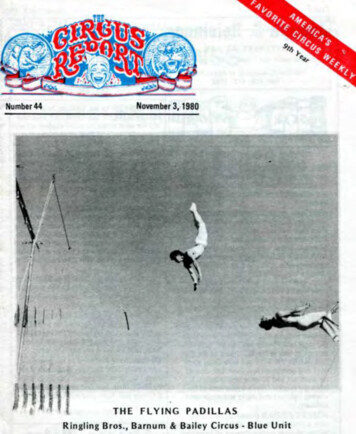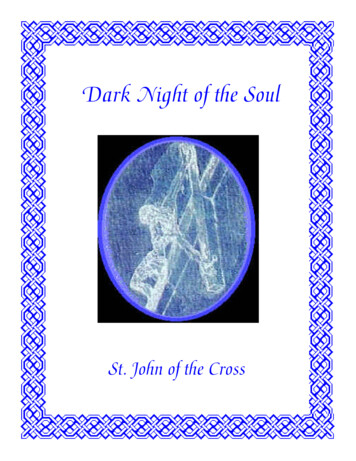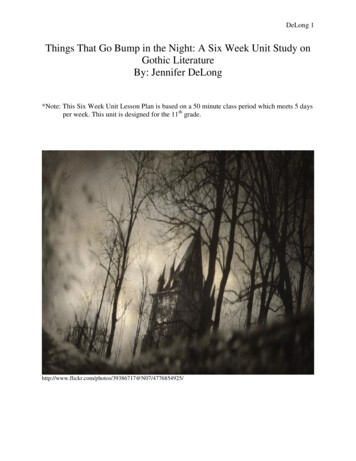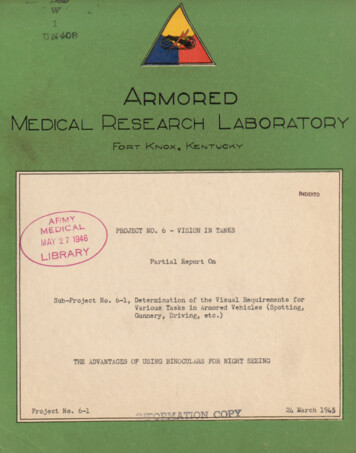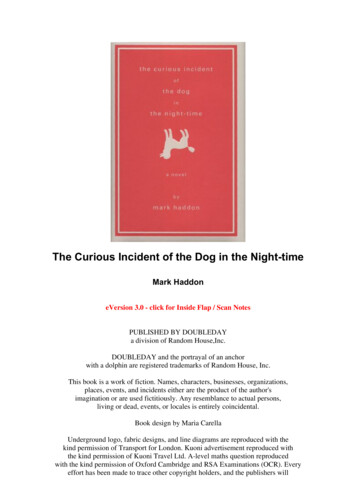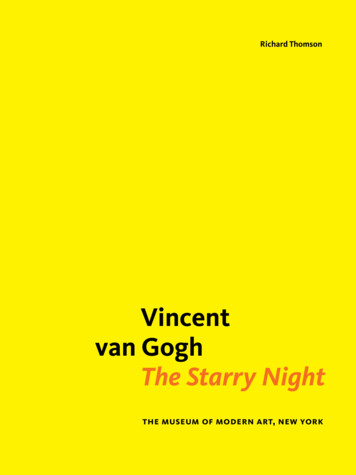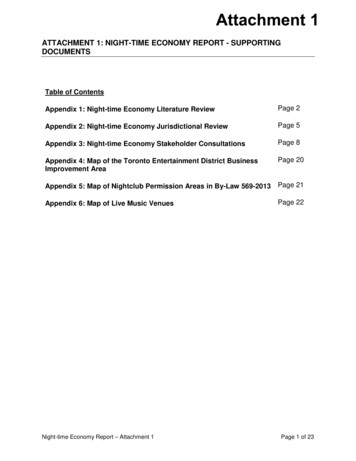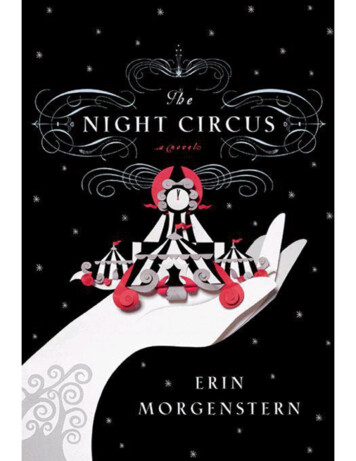
Transcription
This book is a work of fiction. Names, characters, businesses,organizations, places, events, and incidents either are the product of theauthor’s imagination or are used fictitiously. Any resemblance to actualpersons, living or dead, events or locales is entirely coincidental.Copyright 2011 by Night Circus, LLCAll rights reserved. Published in the United States by Doubleday,a division of Random House, Inc., New York.www.doubleday.comDOUBLEDAY and the portrayal of an anchor with a dolphinare registered trademarks of Random House, Inc.Jacket design by John FontanaJacket illustration by Helen MusselwhiteLIBRARY OF CONGRESS CATALOGING-IN-PUBLICATION DATAMorgenstern, Erin.The night circus : a novel / by Erin Morgenstern. — 1st ed.p. cm.1. Magicians—Fiction. 2. Circus—Fiction. 3. Games—Fiction.4. Circus performers—Fiction. I. Title.PS3613.O74875N54 2010813′.6—dc222010050546eISBN: 978-0-385-53464-2v3.1
ContentsCoverTitle PageCopyrightAnticipationPart I: PrimordiumUnexpected Post: New York, February 1873A Gentlemen’s Wager: London, October 1873Shades of Grey: London, January 1874Magic Lessons: 1875–1880Le Bateleur: London, May–June 1884False Pretenses: July–November 1884Target Practice: London, December 1884Darkness and StarsTruth or Dare: Concord, Massachusetts, September 1897Associates and Conspirators: London, February 1885Condolences: New York, March 1885The Contortionist’s Tattoo: London, September 1885Horology: Munich, 1885Auditory: London, April 1886Stratagem: London, April 1886Fire and LightHidden Things: Concord, Massachusetts, October 1902Part II: IlluminationOpening Night I: Inception: London, October 13 and 14, 1886Opening Night II: Sparks: London, October 13 and 14, 1886Opening Night III: Smoke and Mirrors: London, October 13 and 14, 1886The Hanged ManOneiromancy: Concord, Massachusetts, October 1902Rules of the Game: 1887–1889Tasting: Lyon, September 1889Chaperoned: Cairo, November 1890Wishes and Desires: Paris, May 1891Atmosphere: London, September 1891Rêveurs: 1891–1892Collaborations: September–December 1893The Ticking of the Clock: Vienna, January 1894The Magician’s Umbrella: Prague, March 1894Reflections and DistortionsCartomancy: Concord, Massachusetts, October 1902The Wizard in the Tree: Barcelona, November 1894Temporary Places: London, April 1895Movement: Munich, April 1895In Loving Memory of Tara Burgess: Glasgow, April 1895LabyrinthAiluromancy: Concord, Massachusetts, October 1902Tête-à-Tête: London, August 1896Part III: IntersectionsThe LoversThirteen: London, Friday, October 13, 1899Bedtime Stories: Concord, Massachusetts, October 1902Bookkeeping: London, March 1900Three Cups of Tea with Lainie Burgess: London, Basel, and Constantinople, 1900Stormy Seas: Dublin, June 1901An Entreaty: Concord, Massachusetts, October 30, 1902Invitation: London, October 30, 1901Intersections I: The Drop of a Hat: London, October 31–November 1, 1901Darkest Before the Dawn: Concord, Massachusetts, October 31, 1902Intersections II: Scarlet Furies and Red Destinies: London, October 31–November 1, 1901The Pool of TearsFarewell: Concord, Massachusetts, October 30 and 31, 1902Retrospect: London, November 1, 1901Beautiful Pain: London, November 1, 1901
Part IV: IncendiaryTechnicalities: London, November 1, 1901Playing with FireTsukiko: En Route from London to Munich, November 1, 1901Escapement: Concord and Boston, October 31, 1902Impasse: Montréal, August 1902Visitations: September 1902Charming but DeadlyPrecognition: En Route from Boston to New York, October 31, 1902Pursuit: En Route from Boston to New York, November 1, 1902Old Ghosts: London, October 31, 1902Aftermath: New York, November 1, 1902Incendiary: New York, October 31, 1902Transmutation: New York, November 1, 1902Suspended: New York, November 1, 1902The Second Lighting of the Bonfire: New York, November 1, 1902Part V: DivinationFates ForetoldBlueprints: London, December 1902Stories: Paris, January 1903Bons RêvesAcknowledgments
The circus arrives without warning.No announcements precede it, no paper notices on downtown posts and billboards, no mentions or advertisements in local newspapers. It issimply there, when yesterday it was not.The towering tents are striped in white and black, no golds and crimsons to be seen. No color at all, save for the neighboring trees and the grassof the surrounding fields. Black-and-white stripes on grey sky; countless tents of varying shapes and sizes, with an elaborate wrought-iron fenceencasing them in a colorless world. Even what little ground is visible from outside is black or white, painted or powdered, or treated with some othercircus trick.But it is not open for business. Not just yet.Within hours everyone in town has heard about it. By afternoon the news has spread several towns over. Word of mouth is a more effectivemethod of advertisement than typeset words and exclamation points on paper pamphlets or posters. It is impressive and unusual news, the suddenappearance of a mysterious circus. People marvel at the staggering height of the tallest tents. They stare at the clock that sits just inside the gatesthat no one can properly describe.And the black sign painted in white letters that hangs upon the gates, the one that reads:Opens at NightfallCloses at Dawn“What kind of circus is only open at night?” people ask. No one has a proper answer, yet as dusk approaches there is a substantial crowd ofspectators gathering outside the gates.You are amongst them, of course. Your curiosity got the better of you, as curiosity is wont to do. You stand in the fading light, the scarf around yourneck pulled up against the chilly evening breeze, waiting to see for yourself exactly what kind of circus only opens once the sun sets.The ticket booth clearly visible behind the gates is closed and barred. The tents are still, save for when they ripple ever so slightly in the wind. Theonly movement within the circus is the clock that ticks by the passing minutes, if such a wonder of sculpture can even be called a clock.The circus looks abandoned and empty. But you think perhaps you can smell caramel wafting through the evening breeze, beneath the crispscent of the autumn leaves. A subtle sweetness at the edges of the cold.The sun disappears completely beyond the horizon, and the remaining luminosity shifts from dusk to twilight. The people around you are growingrestless from waiting, a sea of shuffling feet, murmuring about abandoning the endeavor in search of someplace warmer to pass the evening. Youyourself are debating departing when it happens.First, there is a popping sound. It is barely audible over the wind and conversation. A soft noise like a kettle about to boil for tea. Then comes thelight.All over the tents, small lights begin to flicker, as though the entirety of the circus is covered in particularly bright fireflies. The waiting crowd quietsas it watches this display of illumination. Someone near you gasps. A small child claps his hands with glee at the sight.When the tents are all aglow, sparkling against the night sky, the sign appears.Stretched across the top of the gates, hidden in curls of iron, more firefly-like lights flicker to life. They pop as they brighten, some accompaniedby a shower of glowing white sparks and a bit of smoke. The people nearest to the gates take a few steps back.At first, it is only a random pattern of lights. But as more of them ignite, it becomes clear that they are aligned in scripted letters. First a C isdistinguishable, followed by more letters. A q, oddly, and several e’s. When the final bulb pops alight, and the smoke and sparks dissipate, it isfinally legible, this elaborate incandescent sign. Leaning to your left to gain a better view, you can see that it reads:Le Cirque des RêvesSome in the crowd smile knowingly, while others frown and look questioningly at their neighbors. A child near you tugs on her mother’s sleeve,begging to know what it says.“The Circus of Dreams,” comes the reply. The girl smiles delightedly.Then the iron gates shudder and unlock, seemingly by their own volition. They swing outward, inviting the crowd inside.Now the circus is open.Now you may enter.
Part IPRIMORDIUMThe whole of Le Cirque des Rêves is formed by series of circles. Perhaps it is a tribute to the origin of the word “circus,” deriving from theGreek kirkos meaning circle, or ring. There are many such nods to the phenomenon of the circus in a historical sense, though it is hardly atraditional circus. Rather than a single tent with rings enclosed within, this circus contains clusters of tents like pyramids, some large andothers quite small. They are set within circular paths, contained within a circular fence. Looping and continuous.—FRIEDRICK THIESSEN, 1892A dreamer is one who can only find his way by moonlight, and his punishment is that he sees the dawn before the rest of the world.—OSCAR WILDE, 1888
Unexpected PostNEW YORK, FEBRUARY 1873The man billed as Prospero the Enchanter receives a fair amount of correspondence via the theater office, but this is the first envelope addressedto him that contains a suicide note, and it is also the first to arrive carefully pinned to the coat of a five-year-old girl.The lawyer who escorts her to the theater refuses to explain despite the manager’s protestations, abandoning her as quickly as he can with nomore than a shrug and the tip of a hat.The theater manager does not need to read the envelope to know who the girl is for. The bright eyes peering out from under a cloud of unrulybrown curls are smaller, wider versions of the magician’s own.He takes her by the hand, her small fingers hanging limp within his. She refuses to remove her coat despite the warmth of the theater, giving onlyan adamant shake of her head when he asks her why.The manager takes the girl to his office, not knowing what else to do with her. She sits quietly on an uncomfortable chair beneath a line of framedposters advertising past productions, surrounded by boxes of tickets and receipts. The manager brings her a cup of tea with an extra lump of sugar,but it remains on the desk, untouched, and grows cold.The girl does not move, does not fidget in her seat. She stays perfectly still with her hands folded in her lap. Her gaze is fixed downward, focusedon her boots that do not quite touch the floor. There is a small scuff on one toe, but the laces are knotted in perfect bows.The sealed envelope hangs from the second topmost button of her coat, until Prospero arrives.She hears him before the door opens, his footsteps heavy and echoing in the hall, unlike the measured pace of the manager who has come andgone several times, quiet as a cat.“There is also a package for you, sir,” the manager says as he opens the door, ushering the magician into the cramped office before slippingoff to attend to other theater matters, having no desire to witness what might become of this encounter.The magician scans the office, a stack of letters in one hand, a black velvet cape lined with shockingly white silk cascading behind him,expecting a paper-wrapped box or crate. Only when the girl looks up at him with his own eyes does he realize what the theater manager wasreferring to.Prospero the Enchanter’s immediate reaction upon meeting his daughter is a simple declaration of: “Well, fuck.”The girl returns her attention to her boots.The magician closes the door behind him, dropping the stack of letters on the desk next to the teacup as he looks at the girl.He rips the envelope from her coat, leaving the pin clinging steadfastly to its button.While the writing on the front bears his stage name and the theater address, the letter inside greets him with his given name, Hector Bowen.He skims over the contents, any emotional impact desired by the author failing miserably and finally. He pauses at the only fact he deemsrelevant: that this girl now left in his custody is, obviously, his own daughter and that her name is Celia.“She should have named you Miranda,” the man called Prospero the Enchanter says to the girl with a chuckle. “I suppose she was not cleverenough to think of it.”The girl looks up at him again. Dark eyes narrow beneath her curls.The teacup on the desk begins to shake. Ripples disrupt the calm surface as cracks tremble across the glaze, and then it collapses in shards offlowered porcelain. Cold tea pools in the saucer and drips onto the floor, leaving sticky trails along the polished wood.The magician’s smile vanishes. He glances back at the desk with a frown, and the spilled tea begins seeping back up from the floor. Thecracked and broken pieces stand and re-form themselves around the liquid until the cup sits complete once more, soft swirls of steam rising intothe air.The girl stares at the teacup, her eyes wide.Hector Bowen takes his daughter’s face in his gloved hand, scrutinizing her expression for a moment before releasing her, his fingers leavinglong red marks across her cheeks.“You might be interesting,” he says.The girl does not reply.He makes several attempts to rename her in the following weeks, but she refuses to respond to anything but Celia.*SEVERAL MONTHS LATER, oncehe decides she is ready, the magician writes a letter of his own. He includes no address, but it reaches its destinationacross the ocean nonetheless.
A Gentlemen’s WagerLONDON, OCTOBER 1873Tonight is the final performance of a very limited engagement. Prospero the Enchanter has not graced the London stage in some time, and thebooking is for a single week of performances, with no matinees.Tickets, though exorbitantly priced, sold out quite quickly, and the theater is so packed, many of the women keep their fans at hand to flutteragainst their décolletage, warding off the heavy heat that permeates the air despite the autumnal chill outside.At one point in the evening, each of those fans suddenly becomes a small bird, until flocks of them loop the theater to uproarious applause. Wheneach bird returns, falling into neatly folded fans on their respective owners’ laps, the applause only grows, though some are too stunned to clap,turning fans of feathers and lace over in their hands in wonder, no longer at all concerned about the heat.The man in the grey suit sitting in the stage-left box does not applaud. Not for this, nor for a single trick throughout the evening. He watches theman upon the stage with a steady, scrutinizing gaze that never wavers through the entire duration of the performance. Not once does he raise hisgloved hands to clap. He does not even lift an eyebrow at feats that elicit applause or gasps, or the occasional shriek of surprise, from the rest ofthe rapt audience.After the performance has concluded, the man in the grey suit navigates the crush of patrons in the theater lobby with ease. He slips through acurtained door leading to the backstage dressing rooms unnoticed. Stagehands and dressers never so much as glance at him.He raps on the door at the end of the hall with the silver tip of his cane.The door swings open of its own accord, revealing a cluttered dressing room lined with mirrors, each reflecting a different view of Prospero.His tailcoat has been tossed lazily over a velvet armchair, and his waistcoat hangs unbuttoned over his lace-edged shirt. The top hat whichfeatured prominently in his performance sits on a hatstand nearby.The man appeared younger on the stage, his age buried under the glare of the footlights and layers of makeup. The face in the mirrors is lined,the hair significantly greying. But there is something youthful in the grin that appears as he catches sight of the man standing in the doorway.“You hated it, didn’t you?” he asks without turning away from the mirror, addressing the ghostly grey reflection. He wipes a thick residue ofpowder from his face with a handkerchief that might once have been white.“It is a pleasure to see you too, Hector,” the man in the grey suit says, closing the door quietly behind him.“You despised every minute, I can tell,” Hector Bowen says with a laugh. “I was watching you, don’t try to deny it.”He turns and extends a hand the man in the grey suit does not accept. In response, Hector shrugs and waves his fingers dramatically in thedirection of the opposite wall. The velvet armchair slides forward from a corner packed with trunks and scarves while the tailcoat floats up from itlike a shadow, obediently hanging itself in a wardrobe.“Sit, please,” Hector says. “It’s not as comfortable as the ones upstairs, I’m afraid.”“I cannot say I approve of such exhibitions,” the man in the grey suit says, taking off his gloves and dusting the chair with them before he sits.“Passing off manipulations as tricks and illusion. Charging admission.”Hector tosses the powder-covered handkerchief onto a table littered with brushes and tins of greasepaint.“Not a single person in that audience believes for a second that what I do up there is real,” he says, gesturing in the general direction of the stage.“That’s the beauty of it. Have you seen the contraptions these magicians build to accomplish the most mundane feats? They are a bunch of fishcovered in feathers trying to convince the public they can fly, and I am simply a bird in their midst. The audience cannot tell the difference beyondknowing that I am better at it.”“That does not make it any less frivolous an endeavor.”“These people line up to be mystified,” Hector says. “I can mystify them easier than most. Seems a waste to let the opportunity pass by. Paysbetter than you might think, as well. Can I get you a drink? There are bottles hidden around here somewhere, though I’m not entirely sure there areglasses.” He attempts to sort through the contents of a table, pushing aside piles of newspapers and a birdless birdcage.“No, thank you,” the man in the grey suit says, shifting in his chair and resting his hands on the handle of his cane. “I found your performancecurious, and the reaction of your audience somewhat perplexing. You were lacking in precision.”“Can’t be too good if I want them to believe I’m as fake as the rest of them,” Hector says with a laugh. “I thank you for coming and sufferingthrough my show. I’m surprised you even turned up, I was beginning to give up hope. I’ve had that box reserved for you the entire week.”“I do not often decline invitations. Your letter said you had a proposition for me.”“I do, indeed!” Hector says, striking his hands together in a single sharp clap. “I was hoping you might be up for a game. It has been far too longsince we’ve played. Though first, you must meet my new project.”“I was under the impression that you had given up on teaching.”“I had, but this was a singular opportunity I could not resist.” Hector walks over to a door mostly hidden by a long, standing mirror. “Celia, dearest,”he calls into the adjoining room before returning to his chair.A moment later a small girl appears in the doorway, dressed too nicely for the chaotic shabbiness of the surroundings. All ribbons and lace,perfect as a shop-fresh doll save for a few unruly curls escaping her braids. She hesitates, hovering on the threshold, when she sees that her fatheris not alone.“It’s all right, dearest. Come in, come in,” Hector says, beckoning her forward with a wave of his hand. “This is an associate of mine, no need tobe shy.”She takes a few steps closer and executes a perfect curtsey, the lace-trimmed hem of her dress sweeping over the worn floorboards.“This is my daughter, Celia,” Hector says to the man in the grey suit, placing his hand on the girl’s head. “Celia, this is Alexander.”“Pleased to meet you,” she says. Her voice is barely more than a whisper, and pitched lower than might be expected from a girl her size.The man in the grey suit gives her a polite nod.“I would like you to show this gentleman what you can do,” Hector says. He pulls a silver pocket watch on a long chain from his waistcoat and putsit on the table. “Go ahead.”The girl’s eyes widen.“You said I was not to do that in front of anyone,” she says. “You made me promise.”“This gentleman is not just anyone,” Hector replies with a laugh.“You said no exceptions,” Celia protests.Her father’s smile fades. He takes her by the shoulders and looks her sternly in the eye.“This is a very special case,” he says. “Please show this man what you can do, just like in your lessons.” He pushes her toward the table with the
watch.The girl nods gravely and shifts her attention to the watch, her hands clasped behind her back.After a moment, the watch begins to rotate slowly, turning in circles on the surface of the table, trailing its chain behind in a spiral.Then the watch lifts from the table, floating into the air and hovering as though it were suspended in water.Hector looks to the man in the grey suit for a reaction.“Impressive,” the man says. “But quite basic.”Celia’s brow furrows over her dark eyes and the watch shatters, gears spilling out into the air.“Celia,” her father says.She blushes at the sharpness of his tone and mumbles an apology. The gears float back to the watch, settling into place until the watch iscomplete again, hands ticking the seconds forward as though nothing had happened.“Now that is a bit more impressive,” the man in the grey suit admits. “But she has a temper.”“She’s young,” Hector says, patting the top of Celia’s head and ignoring her frown. “This is with not even a year of study, by the time she’s grownshe will be incomparable.”“I could take any child off the street and teach them as much. Incomparable is a matter of your personal opinion, and easily disproved.”“Ha!” Hector exclaims. “Then you are willing to play.”The man in the grey suit hesitates only a moment before he nods.“Something a bit more complex than last time, and yes, I may be interested,” he says. “Possibly.”“Of course it will be more complex!” Hector says. “I have a natural talent to play with. I’m not wagering that for anything simple.”“Natural talent is a questionable phenomenon. Inclination perhaps, but innate ability is extremely rare.”“She’s my own child, of course she has innate ability.”“You admit she has had lessons,” the man in the grey suit says. “How can you be certain?”“Celia, when did you start your lessons?” Hector asks, without looking at her.“March,” she answers.“What year, dearest?” Hector adds.“This year,” she says, as though this is a particularly stupid question.“Eight months of lessons,” Hector clarifies. “At barely six years of age. If I recall correctly, you sometimes start your own students a bit youngerthan that. Celia is clearly more advanced than she would be if she did not have natural ability. She could levitate that watch on her first try.”The man in the grey suit turns his attention to Celia.“You broke that by accident, did you not?” he asks, nodding at the watch sitting on the table.Celia frowns and gives him the tiniest of nods.“She has remarkable control for one so young,” he remarks to Hector. “But such a temper is always an unfortunate variable. It can lead toimpulsive behavior.”“She’ll either grow out of it or learn to control it. It’s a minor issue.”The man in the grey suit keeps his eyes on the girl, but addresses Hector when he speaks. To Celia’s ears, the sounds no longer resolve intowords, and she frowns as her father’s responses take on the same muddled quality.“You would wager your own child?”“She won’t lose,” Hector says. “I suggest you find a student you can tolerate parting with, if you do not already have one to spare.”“I assume her mother has no opinion on the matter?”“You assume correctly.”The man in the grey suit considers the girl for some time before he speaks again, and still, she does not comprehend the words.“I understand your confidence in her ability, though I encourage you to at least consider the possibility that she could be lost, should thecompetition not play out in her favor. I will find a player to truly challenge her. Otherwise there is no reason for me to agree to participate. Her victorycannot be guaranteed.”“That is a risk I am willing to take,” Hector says without even glancing at his daughter. “If you would like to make it official here and now, go rightahead.”The man in the grey suit looks back at Celia, and when he speaks she understands the words once more.“Very well,” he says with a nod.“He made me not hear right,” Celia whispers when her father turns to her.“I know, dearest, and it wasn’t very polite,” Hector says as he guides her closer to the chair, where the man scrutinizes her with eyes that arealmost as light and grey as his suit.“Have you always been able to do such things?” he asks her, looking back at the watch again.Celia nods.“My my momma said I was the devil’s child,” she says quietly.The man in the grey suit leans forward and whispers something in her ear, too low for her father to overhear. A small smile brightens her face.“Hold out your right hand,” he says, leaning back in his chair. Celia immediately puts out her hand, palm up, unsure of what to expect. But the manin the grey suit does not place anything in her open palm. Instead, he turns her hand over and removes a silver ring from his pinkie. He slides it ontoher ring finger, though it is too loose for her slim fingers, keeping his other hand around her wrist.She is opening her mouth to state the obvious fact that the ring, though very pretty, does not fit, when she realizes that it is shrinking on her hand.Her momentary glee at the adjustment is crushed by the pain that follows as the ring continues to close around her finger, the metal burning intoher skin. She tries to pull away but the man in the grey suit keeps his hand firmly around her wrist.The ring thins and fades, leaving only a bright red scar around Celia’s finger.The man in the grey suit releases her wrist and she steps back, retreating into a corner and staring at her hand.“Good girl,” her father says.“I will require some time to prepare a player of my own,” the man in the grey suit says.“Of course,” Hector says. “Take all the time you need.” He pulls a gold band from his own hand and puts it on the table. “For when you find yours.”“You prefer not to do the honors yourself?”“I trust you.”The man in the grey suit nods and pulls a handkerchief from his coat, picking up the ring without touching it and placing it in his pocket.“I do hope you are not doing this because my player won the last challenge.”
“Of course not,” Hector says. “I am doing this because I have a player that can beat anyone you choose to put against her, and because timeshave changed enough to make it interesting. Besides, I believe the overall record leans in my favor.”The man in the grey suit does not contest this point, he only watches Celia with the same scrutinizing gaze. She attempts to step out of his line ofsight but the room is too small.“I suppose you already have a venue in mind?” he asks.“Not precisely,” Hector says. “I thought it might be more fun to leave a bit of leeway as far as venue is concerned. An element of surprise, if youwill. I am acquainted with a theatrical producer here in London who should be game for staging the unusual. I shall drop a few hints when the timecomes, and I am certain he will come up with something appropriate. Better to have it on neutral ground, though I thought you might appreciatestarting things on your side of the pond.”“This gentleman’s name?”“Lefèvre. Chandresh Christophe Lefèvre. They say he’s the illegitimate son of an Indian prince or something like that. Mother was some tramp ofa ballerina. I have his card somewhere in this mess. You’ll like him, he’s quite forward-thinking. Wealthy, eccentric. A bit obsessive, somewhatunpredictable, but I suppose that is part and parcel of having an artistic temperament.” The pile of papers on a nearby desk shifts and shuffles untila single business card finds its way to the surface and sails across the room. Hector catches it in his hand and reads it before handing it to the manin the grey suit. “He throws wonderful parties.”The man in the grey suit puts it in his pocket without so much as glancing at it.“I have not heard of him,” he says. “And I am not fond of public settings for such matters. I will take it under consideration.”“Nonsense, the public setting is half the fun! It brings in so many restrictions, so many challenging parameters to work around.”The man in the grey suit considers this for a moment before he nods.“Do we have a disclosure clause? It would be fair, given my awareness of your choice of player.”“Let’s have no clauses at all beyond the basic rules of interference and see what happens,” Hector says. “I want to push boundaries with this one.No time limits, either. I’ll even give you first move.”“Very well. We have an agreement. I shall be in touch.” The man in the grey suit stands, brushing invisible dust from his sleeve. “It was a pleasureto meet you, Miss Celia.”Celia bobs another perfect curtsey, all the while regarding him with wary eyes.The man in the grey suit tips his hat to Prospero and slips out the door and then out of the theater, moving like a shadow onto the busy street.*IN HIS DRESSING ROOM,Hector Bowen chuckles to himself while his daughter stands quietly in a corner, looking at the scar on her hand. The painfades as quickly as the ring itself, but the raw red mark remains.Hector takes the silver pocket watch from the table, comparing the time to the clock on the wall. He winds the watch slowly, regarding the handsintently as they swirl around the face.“Celia,” he says without looking up at her, “why do we wind our watch?”“Because everything requires energy,” she recites obediently, eyes still focused on her hand. “We must put effort and energy into anything wewish to change.”“Very good.” He shakes the watch gently and replaces it in his pocket.“Why did you call that man Alexander?” Celia asks.“That’s a silly question.”“It’s not his name.”“Now, how might you know that?” Hector asks his daughter, lifting her chin to face him and weighing the look i
When the tents are all aglow, sparkling against the night sky, the sign appears. Stretched across the top of the gates, hidden in curls of iron, more firefly-like lights flicker to life. They pop as they brighten, some accompanied by a shower of glowing white sparks and a bit of smok
